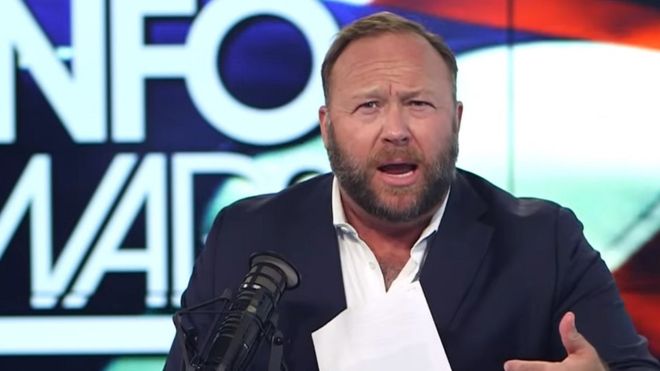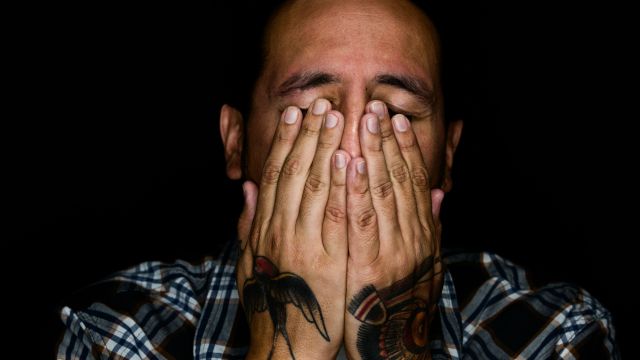Alex Jones sued over Sandy Hook conspiracies, calls it attack on 1st Amendment

Six families of victims killed in the Sandy Hook shootings and an FBI agent who responded to the scene filed a defamation lawsuit on Wednesday, May 23 against Alex Jones, the controversial internet personality who called the massacre “fake”.
The lawsuit, filed in Connecticut, states that Jones has made numerous, repeated false claims about the 2012 shootings, including that victims and families were “crisis actors” and that it was an elaborate hoax orchestrated by the government to take away guns from the public.
“Yeah, so, Sandy Hook is a synthetic completely fake with actors, in my view, manufactured,” the lawsuit quotes Jones as saying in 2015.
The Sandy Hook shootings left 20 children and six adults dead on December 14, 2012.
The lawsuit continues: “Jones is the chief amplifier for a group that has worked in concert to create and propagate loathsome, false narratives about the Sandy Hook shooting and its victims, and promote their harassment and abuse.”
There are six companies named in the suit, including ones tied to Jones’ remarkably popular website Infowars, a right-leaning talk show with a penchant for conspiracy theories and belligerent tirades about things Jones despises: anti-gun politics, Hillary Clinton, globalists, and tap water that turns frogs gay.
His YouTube channel currently has about 2.3 million subscribers, and his infowarsstore.com is estimated to sell between $7 to $12 million in dietary supplements a year, in addition to sales of T-shirts, books, and doomsday gear. Jones even claims he’s received several early morning phone calls from President Donald Trump, who’s publicly congratulated the host for his “amazing” reputation.
The families of the Sandy Hook victims would likely pick a different adjective.
“Jones’s actions subjected the families and survivors of the Sandy Hook shooting to physical confrontations and harassment, death threats and personal attacks on social media,” the families’ attorney said in a statement given to NBC News. “Alex Jones and his co-conspirators engineered and maintained this campaign for a simple reason: greed.”
Jones has backtracked his assertion that Sandy Hook was a hoax, saying in recent years that he had initial questions about what actually happened the day of the shooting, but ultimately believes people really died.
In a video published Wednesday, Jones framed the Sandy Hook defamation lawsuits, of which there are now three, as an attack on the First Amendment and, basically, a conspiracy against him, one that seeks to de-platform Infowars, setting a prohibitive precedent for fringe media that enables liberal, globalist media to make more money and control the political narrative.
“This is all out of context… And it’s not even what I said or my intent,” Jones said about the lawsuits. “I’m not going to get into the real defects of this, I’m going to wait until it’s thrown out with prejudice.”
“This is the modern Lexington, this is the modern Concord,” he continued. “This is the modern fight where they’re coming to take it all… This is defamation against me, it’s an information war. It’s a misrepresentation… They can find lawyers every week to file disinformation. It says they’re desperate and they’re wild and it shows we’ve got to get past their intimidation.”
Here’s one quote from Jones that was supposedly taken out of context.
“We’ve clearly got people where it’s actors playing different parts of different people,” the suit lists Jones saying on March 14, 2014. “I’ve looked at it and undoubtedly there’s a cover-up, there’s actors, they’re manipulating, they’ve been caught lying and they were pre-planning before it and rolled out with it.”
The First Amendment does not protect defamation, which is broadly defined as false statements that cause someone harm. Still, the families of the Sandy Hook victims, as well as the FBI agent included in the lawsuit, might have a hard time winning the case, as Rich Barlow explained in a piece for WBUR’s Cognoscenti:
“To win damages, the plaintiffs must prove Jones either knew his hoax claims were false or recklessly disregarded whether they were true, a former law professor told Texas Monthly: ‘What I understand is that he’ll say these things at one point, and then later on, he’ll say, ‘Of course I know that wasn’t true.’ If he says things, and then says he knows it wasn’t true, he’s in trouble.’”




